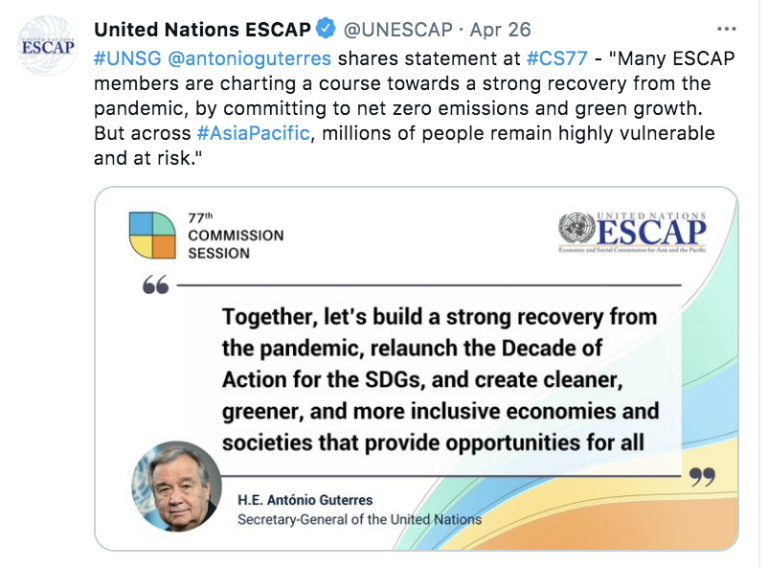Asia-Pacific region urged to “build back better”
The United Nations Economic and Social Commission for Asia and the Pacific (ESCAP) is holding its 77th session with a focus on how to “build back better” from the COVID-19 pandemic. “The attainment of the Sustainable Development Goals in Asia and the Pacific is at stake,” said Armida Salsiah Alisjahbana, United Nations Under-Secretary-General and Executive Secretary of ESCAP. She noted that the health crisis, together with measures to mitigate its impacts, have deeply affected countries of Asia and the Pacific, both economically and socially, over the past year.

The United Nations Economic and Social Commission for Asia and the Pacific (ESCAP) is holding its 77th session with a focus on how to “build back better” from the COVID-19 pandemic.
“The attainment of the Sustainable Development Goals in Asia and the Pacific is at stake,” said Armida Salsiah Alisjahbana, United Nations Under-Secretary-General and Executive Secretary of ESCAP. She noted that the health crisis, together with measures to mitigate its impacts, have deeply affected countries of Asia and the Pacific, both economically and socially, over the past year.

UN Secretary-General Antonio Guterres told the ministerial session that it was vital that the world’s most populous region protects its environment and make stronger efforts to tackle climate change, including investing in renewable energy, sustainable food systems, and nature-based solutions.
“Looking forward, recovery plans cannot be based on outdated, unsustainable economic models. Investments to rebuild the economy must be centred around inclusive, sustainable development that prioritizes people and planet,” said Mr Guterres.
This message was echoed by WMO Secretary-General Prof. Petteri Taalas, who warned that the negative impact of climate change will far outlast the damage to global health and economic development inflicted by the COVID-19 pandemic.
“Extreme weather and climate conditions have continued into 2021,” said Prof. Taalas. “In 2020, the Asia-Pacific region was particularly hard hit by successive weather and climate-related hazards, including tropical cyclones, floods, droughts, sand and dust storms and heatwaves. Failure to tackle climate change will have a negative impact on global economies, human living conditions and marine and land ecosystems, which may last up to centuries,” he said.
“The WMO’s annual state of the Global Climate Report showed that 2020 was one of the three warmest years on record, despite La Niña cooling in the Pacific Ocean. The economic and industrial downturn as a result of the Coronavirus pandemic is not a substitute for concerted and coordinated climate action. Experience suggests that emission declines during economic crises are followed by a rapid upsurge. We need to change that trajectory,” said Prof. Taalas.
It marked the first time that a WMO Secretary-General has addressed the ministerial session of ESCAP. Established in 1947, it is the largest of the UN’s five regional commissions – both in terms of geographic coverage and population served – its membership spanning from the Pacific island nation of Kiribati in the east, to Turkey in the west, and Russia in the north, to New Zealand in the south. ESCAP’s membership also includes France, the Netherlands, the United Kingdom, and the United States.
To build back better through regional cooperation in Asia and the Pacific, WMO is driving several important initiatives in collaboration with our partners, to better support our Members in these efforts:
- Systematic Observations Financing Facility (SOFF)
- Climate and Water Coalition
- Climate Risk and Early Warning Systems (CREWS) initiative
WMO believes these capacity-development initiatives complementing existing WMO technical activities aimed at enhancing regional capabilities in weather and climate-related areas will better support countries in their transition to impact-based services. This will see a fundamental shift from focusing on “what the weather will be” to “what the weather will do”.
WMO and UNESCAP in 2020 focused on implementing collaborative activities under their Memorandum of Understanding (MoU). These activities highlight the synergistic benefits that are derived from both organisations’ work on building resilience to climate and disaster risks and the promotion of impact-based early warning services and systems.
Looking ahead, with its official membership in the United Nations’ Regional Collaborative Platform in Asia and the South-West Pacific, WMO will build on the achievements of 2020 and further expand regional cooperation in the broader context of sustainable development. It looks forward to continued cooperation with ESCAP and its Member States in advancing progress on the SDGs.

